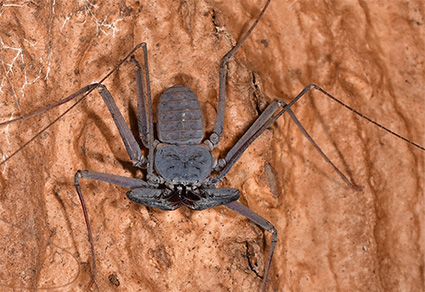Abstract
To date, only one species of whip spider has been recorded in China. Here, we describe a new species, Weygoldtia hainanensis sp. nov., from Hainan, China. The new species is morphologically similar to W. davidovi (Fage, 1946) and W. consonensis Miranda et al. 2021, but can be distinguished with a combination of the following characters: 26 segments in tibia I, 6-7 teeth on chelicerae, distitibia IV trichobothria sc and sf series each with 10-11 trichobothria. To validate our morphological inferences and support the erection of W. hainanensis sp. nov. as a new species, we sequenced the COI gene region for two individuals and performed molecular phylogenetic analyses. The inferred phylogenetic trees placed the new species within Weygoldtia and highlighted the evolutionary distinction between W. hainanensis sp. nov. and currently described whip spiders. The type specimens are deposited in the Museum of Biology, East China Normal University (ECNU).
References
Arabi, J., Cruaud, C., Couloux, A. & Hassanin, A. (2010) Studying sources of incongruence in arthropod molecular phylogenies: sea spiders (Pycnogonida) as a case study. Comptes Rendus Biologies, 333 (5), 438–453. https://doi.org/10.1016/j.crvi.2010.01.018.
Bain, R. & Hurley, M. (2011) A biogeographic synthesis of the amphibians and reptiles of Indochina. Bulletin of the American Museum of Natural History, 360, 1–138. https://doi.org/10.1206/360.1
Blackmon, H. & Adams, R.H. (2015) evobiR: Comparative and population genetic analyses. R package Version 1.1. Available from: https://CRAN.R-project.org/package=evobiR (accessed 30 November 2021)
Foelix, R.F. & Hebets, E.A. (2001) Sensory biology of whip spiders (Arachnida, Amblypygi). Andrias, 15, 129–140.
Garwood, R.J., Dunlop, J.A., Knecht, B.J. & Hegna, T.A. (2017) The phylogeny of fossil whip spiders. BMC Evolutionary Biology, 17 (1), 1–14. https://doi.org/10.1186/s12862-017-0931-1
Giupponi, A. & Kury, A. (2013) Two new species of Heterophrynus Pocock, 1894 from Colombia with distribution notes and a new synonymy (Arachnida: Amblypygi: Phrynidae). Zootaxa, 3647 (2), 329–342. https://doi.org/10.11646/zootaxa.3647.2.5
Harvey, M.S. & West, P.L.J. (1998) New species of Charon (Amblypygi, Charontidae) from northern Australia and Christmas Island. Journal of Arachnology, 26, 273–284.
Huelsenbeck, J.P. & Ronquist, F. (2001) MRBAYES: Bayesian inference of phylogenetic trees. Bioinformatics, 17(8), 754–755. https://doi.org/10.1093/bioinformatics/17.8.754
Kalyaanamoorthy, S., Minh, B., Wong, T.K.F., von Haeseler, A. & Jermiin, L.S. (2017) ModelFinder: fast model selection for accurate phylogenetic estimates. Nature Methods, 14 (6), 587–589. https://doi.org/10.1038/nmeth.4285
Katoh, K. & Standley, D.M. (2013) MAFFT multiple sequence alignment software version 7: improvements in performance and usability. Molecular Biology and Evolution, 30 (4), 772–780. https://doi.org/10.1093/molbev/mst010
Liang, G. (2018) A study of the genesis of Hainan Island. Geology in China, 45(4), 693–705. https://doi.org/10.12029/gc20180404
Liu, Y. & Morinaga, H. (1999) Cretaceous palaeomagnetic results from Hainan Island in south China supporting the extrusion model of Southeast Asia. Tectonophysics, 301, 133–144. https://doi.org/10.1016/S0040-1951(98)00216-9.
Minh, B.Q., Schmidt, H.A., Chernomor, O., Schrempf, D., Woodhams, M.D., Von Haeseler, A. & Lanfear, R. (2020) IQ-TREE 2: new models and efficient methods for phylogenetic inference in the genomic era. Molecular Biology and Evolution, 37 (5), 1530–1534. https://doi.org/10.1093/molbev/msaa015
Miranda, G., Giupponi, A., Prendini, L. & Scharff, N. (2018) Weygoldtia, a new genus of Charinidae Quintero, 1986 (Arachnida, Amblypygi) with a reappraisal of the genera in the family. Zoologischer Anzeiger, 273, 23–32. https://doi.org/10.1016/j.jcz.2018.02.003
Miranda, G. & Reboleira, A. (2019) Amblypygids of Timor-Leste: first records of the order from the country with the description of a remarkable new species of Sarax (Arachnida, Amblypygi, Charinidae). Zookeys, 820, 1–12. https://doi.org/10.3897/zookeys.820.30139
Miranda, G.S., Giupponi, A.P., Scharff, N. & Prendini, L. (2021a) Phylogeny and biogeography of the pantropical whip spider family Charinidae (Arachnida: Amblypygi). Zoological Journal of the Linnean Society, zlaa101, i–xx + 1–45. https://doi.org/10.1093/zoolinnean/zlaa101
Miranda, G.S., Gluppoin, A.P., Prendini, L. & Scharff, N. (2021b) Systematic revision of Charinidae Quintero, 1986 (Arachnida, Amblypygi). European Journal of Taxonomy, 772, 1–409. https://doi.org/10.5852/ejt.2021.772.1505
Qi, S., Grismer, L.L., Lyu, Z.-T., Zhang, L., Li, P.P. & Wang, Y.-Y. (2020a) A definition of the Goniurosaurus yingdeensis group (Squamata: Eublepharidae) with the description of a new species. Zookeys, 986, 127–155. https://doi.org/10.3897/zookeys.986.47989
Qi, S., Wang, J., Grismer, L.L., Chen, H.-H., Lyu, Z.-T. & Wang, Y.-Y. (2020b) The Stoor Hobbit of Guangdong: Goniurosaurus gollum sp. nov., a cave-dwelling Leopard Gecko (Squamata, Eublepharidae) from South China. Zookeys, 991, 137–153. https://doi.org/10.3897/zookeys.991.54935
Rahmadi, C., Harvey, M.S. & Kojima, J. (2010) Whip spiders of the genus Sarax Simon 1892 (Amblypygi: Charinidae) from Borneo Island. Zootaxa, 2612 (1), 1–21. https://doi.org/10.11646/zootaxa.2612.1.1
Reveillion, F. & Pierre-Olivier, M. (2018) A new species of Charon (Amblypygi: Charontidae) from Orchid Island (Taiwan). Revista Ibérica de Aracnología 32, 31–36.
Seiter, M., Wolff, J. & Hörweg, C. (2015) A new species of the South East Asian genus Sarax Simon, 1892 (Arachnida: Amblypygi: Charinidae) and synonymization of Sarax mediterraneus Delle Cave, 1986. Zootaxa, 4012 (3), 542–552. https://doi.org/10.11646/zootaxa.4012.3.8
Trifinopoulos, J., Nguyen, L. T., von Haeseler, A. & Minh, B. Q. (2016) W-IQ-TREE: a fast online phylogenetic tool for maximum likelihood analysis. Nucleic Acids Research, 44 (W1), W232–W235. https://doi.org/10.1093/nar/gkw256
Weygoldt, P. (2009) Courtship and mating in the whip spider Phrynichus orientalis Weygoldt, 1998 (Chelicerata: Amblypygi). Zoologischer Anzeiger, 248 (3), 177–181. https://doi.org/10.1016/j.jcz.2009.09.001
Wolff, J.O., Seiter, M. & Gorb, S.N. (2015) Functional anatomy of the pretarsus in whip spiders (Arachnida,Amblypygi). Arthropod Structure & Development, 44, 524–540. https://doi.org/10.1016/j.asd.2015.08.014
Xu, Y., Lin, S., He, J., Xin, Y., Zhang, L., Jiang, H. & Li, Y. (2017) Tropical birds are declining in the Hainan Island of China. Biological Conservation, 210, 9–18. https://doi.org/10.1016/j.biocon.2016.05.029
Zhu, H. (2016) Biogeographical evidences help revealing the origin of Hainan Island. PLoS One, 11(4), e0151941. https://doi.org/10.1371/journal. pone.0151941
Zhu, X.Y., Chen, G.Y., Román-Palacios, C., Li, Z. & He, Z.Q. (2020a) Goniurosaurus gezhi sp. nov., a new gecko species from Guangxi, China (Squamata: Eublepharidae). Zootaxa, 4852 (2), 211–222. https://doi.org/10.11646/zootaxa.4852.2.6
Zhu, X.-Y., Shen, C.-Z., Liu, Y.-F., Chen, L., Li, Z. & He, Z.-Q. (2020b) A new species of Goniurosaurus from Hainan Island, China based on molecular and morphological data (Squamata: Sauria: Eublepharidae). Zootaxa, 4772 (2), 349–360. https://doi.org/10.11646/zootaxa.4772.2.6
Zhu, X., Liu, Y., Bai, Y., Román-Palacios, C., Li, Z. & He, Z. (2021) Goniurosaurus chengzheng sp. nov., a new species of Leopard Gecko from Guangxi, China (Squamata: Eublepharidae). Zootaxa, 4996 (3), 540–554. https://doi.org/10.11646/zootaxa.4996.3.8


